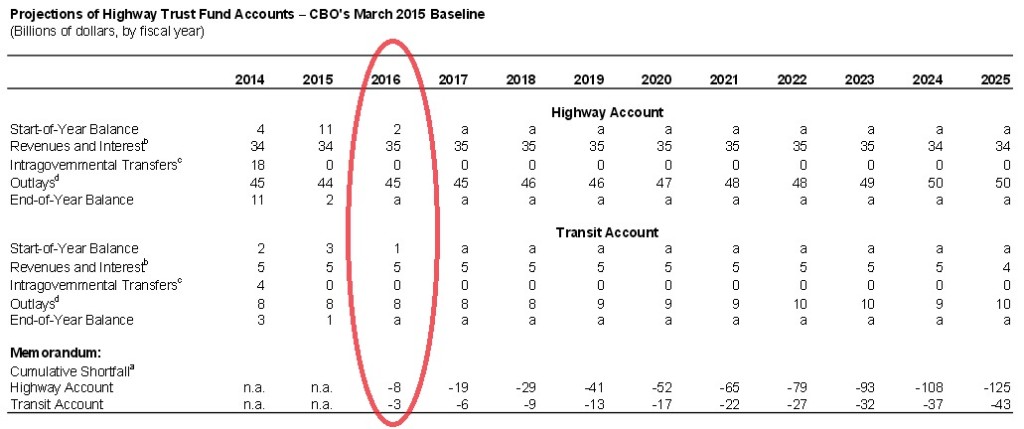Action to Fix Highway Trust Fund Needed by This Summer
March 9th, 2015 | By: America's Infrastructure Report Card
Tags: bridges, highway trust fund, infrastructure, roads, transit, transportation
No Comments »
2015 Report Card for Iowa’s Infrastructure Arrives Next Tuesday
February 19th, 2015 | By: Infrastructure Report Card
The Iowa Section of the American Society of Civil Engineers (ASCE) will release the inaugural 2015 Report Card for Iowa’s Infrastructure on Tuesday, February 24. The report includes evaluations of Iowa aviation, rail, inland waterways, roads, bridges, dams, levees, drinking water, wastewater, electrical energy, and solid waste.News conference on release of the 2015 Report Card for Iowa’s Infrastructure
WHO: American Society of Civil Engineers – Iowa Section
Speakers:
- Joe Spradling, P.E., president, Iowa Section ASCE
- Aaron Granquist, P.E., author and member, Report Card Committee
- Director Debi Durham, Iowa Economic Development Authority
WHEN: Tuesday, February 24, 2015 at 10:30 am
WHERE: Wallace Building Auditorium, 502 E 9th Street, Des Moines, Iowa
Tags: bridges, economy, infrastructure, Iowa, report card, roads, transportation, water
No Comments »
Chime in on Wednesday to Fix the Trust Fund
February 9th, 2015 | By: Becky Moylan
As Congress continues the debate on the best way to #FixTheTrustFund and modernize America’s roads, bridges, and transit, USDOT Sec. Foxx and Transportation & Infrastructure Chairman Bill Shuster are heading to Twitter for a bipartisan “townhall” to discuss surface transportation. The town hall, a first of its kind, will be Wednesday, Feb. 11 after Sec. Foxx concludes his testimony in from of the U.S. House of Representatives’ Transportation & Infrastructure Committee, around 12 p.m. ET.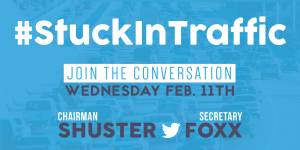 Now it’s up to you to ask your questions about transportation investment and voice your support for a long-term funding solution. To get the conversation rolling, here are some key facts from the 2013 Report Card for America’s Infrastructure that would make great tweeting material. To join in the conversation, use #StuckInTraffic anytime between now and Wednesday.
Now it’s up to you to ask your questions about transportation investment and voice your support for a long-term funding solution. To get the conversation rolling, here are some key facts from the 2013 Report Card for America’s Infrastructure that would make great tweeting material. To join in the conversation, use #StuckInTraffic anytime between now and Wednesday.
- One in nine U.S. bridges is structurally deficient.
- 45% of Americans don’t have access to public transportation.
- 42% of major urban highways are congested, costing the economy $101B a year.
- 32% of America’s major roads are in poor or mediocre condition.
- Americans spend nearly a week’s worth of vacation time—34 hours—stuck in traffic each year.
- If we don’t improve our transportation infrastructure, each family’s budget will lose $1060 a year by 2020.
- If we don’t improve our transportation infrastructure, America will lose 877,000 jobs by 2020.
Tags: bridges, congress, highway trust fund, roads, surface transportation, transit
No Comments »
Senator’s 2020 Vision For America’s Infrastructure
January 27th, 2015 | By: Becky Moylan
Aging infrastructure, graded at a D+ national GPA, is no secret. In fact, it is the news each and every day. From a water main break that hindered a morning commute in DC, to the potholes that inhibit safe driving, Americans across the country are experiencing inconveniences and challenges because of deficient roads, bridges, water pipes and other infrastructure. Furthermore, we have an investment shortfall across our major infrastructure sectors of just over $200 billion a year. Underinvesting in these vital systems costs us more in the long run. Today, Sen. Sanders shared his bill as a vision to better fund infrastructure and address the backlog of needs. As the new ranking member of the Senate Budget Committee, Sen. Sanders is taking the opportunity to introduce a $1 trillion, five-year plan for the nation’s infrastructure. The measure would inject an additional $75 billion a year into the Highway Trust Fund, create a national infrastructure bank and expand financing and grant programs. Additionally, it would fund freight and passenger rail improvements, airports, water projects, ports and inland waterways and national parks, along with broadband and electric networks. ASCE’s Casey Dinges joined the Senator from Vermont to share our vision of what needs to happen to improve our nation’s infrastructure. During his remarks, Casey said “By taking steps to invest in our nation’s infrastructure, the U.S. can protect $3.1 trillion in GDP, $1.1 trillion in U.S. trade value and 3.5 million jobs and a little over $3,000 a year per family. Without these investments, infrastructure – the backbone of our nation’s economy – will continue to decline and Americans will pay the price.” With the need to #FixTheTrustFund looming ahead, this bill is a positive step in the conversation and a good reminder that inaction is not an option.Tags: #fixthetrustfund, aviation, bridges, report card, roads, transportation
3 Comments »
Michigan Legislature Defers to the Public on Gas Tax
December 22nd, 2014 | By: Maria Matthews
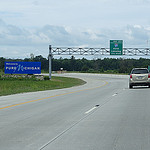
Photo Credit: Sean Marshall/Flickr
- Increases vehicle registration fees by eliminating the 10% discount made available to new car buyers during their first three years of ownership.
- Raises registration fees for commercial trucks, hybrid and electric vehicles.
- Designates a portion of the additional revenue for transit.
- Eliminate all sales or use taxes on gasoline and diesel fuel used in motor vehicles operated on public roads or highways beginning on October 1, 2015;
- Allow an increase in the sales tax rate from 6 percent to 7 percent;
- Activate other laws dedicating additional revenue for transportation purposes, including repair of roads, streets, and bridges;
- Require state funds for school aid to be used exclusively for financial assistance for public school districts, community colleges, and career and technical education and related scholarships; and
- Dedicate a portion of use tax revenue for school aid purposes.
Tags: gas tax, infrastructure, roads
2 Comments »
Nevada Report Card Reveals a $15B Infrastructure Problem
December 16th, 2014 | By: Infrastructure Report Card
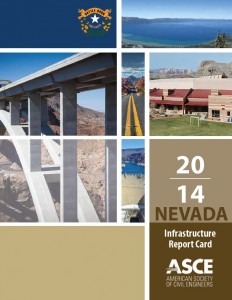 During the past twenty years Nevada experienced one of the largest growth surges in the country and then one of the worst downturns from late 2008 through 2013. This roller coaster economy decreased funding levels and preventive maintenance suffered leaving many infrastructure systems underfunded. Hardest hit may be school facilities in both rural communities and cities. Nevada’s funding for maintaining schools stagnated and left a funding shortfall of over $5 billion during the next 5 to 10 years.
The 2014 Report Card for Nevada’s Infrastructure, released today by the Nevada Section of the American Society of Civil Engineers (ASCE), gave the state’s infrastructure a grade of “C-.” The Report Card identifies more than 15 billion in needs across Nevada’s critical infrastructure sectors over 20 years, including:
Dams and Flood Control:
During the past twenty years Nevada experienced one of the largest growth surges in the country and then one of the worst downturns from late 2008 through 2013. This roller coaster economy decreased funding levels and preventive maintenance suffered leaving many infrastructure systems underfunded. Hardest hit may be school facilities in both rural communities and cities. Nevada’s funding for maintaining schools stagnated and left a funding shortfall of over $5 billion during the next 5 to 10 years.
The 2014 Report Card for Nevada’s Infrastructure, released today by the Nevada Section of the American Society of Civil Engineers (ASCE), gave the state’s infrastructure a grade of “C-.” The Report Card identifies more than 15 billion in needs across Nevada’s critical infrastructure sectors over 20 years, including:
Dams and Flood Control:
- With the majority of funding for flood management coming from local gas and sales tax initiatives, there continues to be projected funding shortfalls upwards of $400 million.
- The state has 158 high hazard dams, which could lead to loss-of-life or significant property damage if dam failure occurs.
- The state budget for high hazard dams is nearly half the national average.
- In 2005, $500,000 of investments were made in aviation through the Nevada Aviation Trust Fund, resulting in an economic impact of over $20 million. However, since that time no state funding has been allocated into the Trust Fund to leverage federal funding.
- The Nevada Department of Transportation maintains 5,300 miles of state highways, which include many rural roadways within Nevada.
- Current funding levels provide only 60 to 70 percent of the required funding to maintain state highways.
- In Clark and Washoe Counties, 45 percent of schools are more than 30 years old.
- In other counties throughout the state, there are schools with campuses over 100 years old.
- Every dollar held back from school operation and maintenance budgets escalates emergency repair budgets 400 percent.
Tags: #HighwayTrustFund, dams, flood control, Nevada, report card, roads, schools
No Comments »
Higher Gas Taxes Will Help Michigan Build a 21st Century Infrastructure
December 4th, 2014 | By: Maria Matthews
In 1997, Dolly was cloned, we were excited by the release of IE 4, and ASCE hadn’t yet released its first Report Card for America’s Infrastructure. It is also the last time Michigan increased its gas tax to the current 19-cents per gallon. The diesel tax rate has been in effect since 1984. The time is now for the state legislature to take action. HB 5477 was approved by the Michigan Senate on November 13th. It’s now the Michigan House’s turn to send this measure to the Governor’s desk. This bill will gradually increase the fuel tax to 15.5% through 2018. Governor Rick Snyder (R) has been actively urging the legislature to send him an infrastructure funding bill. The 2009 Michigan Report Card gave the state’s roads and bridges a “D” grade. While this might be within range of the national average, roads in poor conditions cost the average Michigander about $538.96 in extra vehicle repairs and general operating costs. This is an almost 10% increase since the 2009 assessment. If enacted, drivers will see a gradual increase in the state gas tax over the next four years, which results in additional road and transportation project funding. Michigan needs the additional tax revenue to maintain and improve its roads. Signing this transportation bill into law would also:- The initial 3.5% increase to 9.5% per gallon could result in an immediate $205 million in additional revenue. When the tax is in full effect in January 2019 an estimated $1.25 billion in revenue will be generated.
- The tax will be calculated based on a flat rate of $2.81 over the next several years rather than being fixed to the consumer price index. This will help ensure a more steady increase in revenue, at 2% per year for 3 years, through 2019.
- Anticipated revenue will be allocated to the Michigan Transportation Fund (MTF) and should only be available to for use on transportation related projects.
Tags: gas tax, roads, transportation
No Comments »
ASCE Past President Flies Over Pittsburgh on 60 Minutes
November 24th, 2014 | By: Becky Moylan
ASCE Past President Andy Herrmann flew over the “city of bridges” with 60 Minutes’ Steve Kroft to highlight America’s aging bridges in a segment that aired Sunday, Nov. 23. Falling apart: America’s neglected infrastructure Herrmann was among several experts interviewed for the piece, including former Secretary of Transportation Ray LaHood and Congressman Earl Blumenauer (D-OR). While each guest brought different experiences, they all agreed on one thing: the need for increased funding. One in nine bridges in the U.S. are structurally deficient and the gas tax, last increased in 1993, simply cannot fully-fund a 2014 transportation network. As Herrmann said, “It all comes down to funding.” It is now up to Congress to #FixTheTrustFund with a long-term, sustainable funding solution that will address our aging infrastructure.Tags: bridges, highway trust fund, Report Card for America's Infrastructure, roads
1 Comment »
ASCE Past President Andy Herrmann To Talk Infrastructure with 60 Minutes
November 21st, 2014 | By: Becky Moylan
This Sunday, Nov. 23, ASCE Past President Andrew W. Herrmann, P.E. SECB, F.ASCE, will discuss the state of our nation’s bridges during primetime TV on CBS’ 60 Minutes via a helicopter tour of Pittsburgh. 60 Minutes Video – The roads and bridges Americans drive on every day are in dire need of repair or replacement As the Highway Trust Fund heads once again toward insolvency, 60 Minutes chronicles the need for increased investment across the U.S. with interviews from former Secretary of Transportation Ray LaHood and Rep. Earl Blumenauer. Each with a unique perspective on infrastructure, all these guests will echo the same message: #FixTheTrustFund with a long-term, sustainable funding solution. Host a viewing party, set your DVR, and tell your friends and family to tune in at 7:30 p.m. ET/7 p.m. PT to see ASCE tell the story behind our nation’s bridges.Tags: 60 minutes, bridges, highway trust fund, infrastructure, Report Card for America's Infrastructure, roads
4 Comments »
Infrastructure in Arkansas Earns D+
October 17th, 2014 | By: Infrastructure Report Card
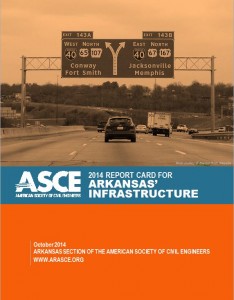 This Thursday, the Arkansas Section of the American Society of Civil Engineers released their inaugural Infrastructure Report Card for the state grading the states’ infrastructure.
Arkansas’ infrastructure received a cumulative GPA of “D+” in the 2014 Report Card for Arkansas’ Infrastructure. The seven infrastructure categories evaluated in the report include:
Roads (D+)
Drinking water (D+)
Transit (D+)
Levees (D)
Dams (D)
Bridges (C+)
Wastewater (C+)
The report noted that Arkansas has the 12th largest highway system in the nation, as well as the second highest traffic fatality rate in the country as of 2010. In addition, the state has 214 wastewater treatment facilities that will need upgrades and improvements in the next 20 years.
The Report Card, the first for Arkansas, was released during the annual ASCE Arkansas Section Conference and included a keynote address by Scott Bennett, director of the Arkansas State Highway and Transportation Department. The report was featured in both the Arkansas Democrat-Gazette and the Times-Record. The effort was led by Aaron Robinson, P.E., based in Jacksonville, Arkansas.
Read the full Arkansas Report Card
This Thursday, the Arkansas Section of the American Society of Civil Engineers released their inaugural Infrastructure Report Card for the state grading the states’ infrastructure.
Arkansas’ infrastructure received a cumulative GPA of “D+” in the 2014 Report Card for Arkansas’ Infrastructure. The seven infrastructure categories evaluated in the report include:
Roads (D+)
Drinking water (D+)
Transit (D+)
Levees (D)
Dams (D)
Bridges (C+)
Wastewater (C+)
The report noted that Arkansas has the 12th largest highway system in the nation, as well as the second highest traffic fatality rate in the country as of 2010. In addition, the state has 214 wastewater treatment facilities that will need upgrades and improvements in the next 20 years.
The Report Card, the first for Arkansas, was released during the annual ASCE Arkansas Section Conference and included a keynote address by Scott Bennett, director of the Arkansas State Highway and Transportation Department. The report was featured in both the Arkansas Democrat-Gazette and the Times-Record. The effort was led by Aaron Robinson, P.E., based in Jacksonville, Arkansas.
Read the full Arkansas Report Card
Tags: Arkansas, bridges, dams, infrastructure, levees, report, report card, roads, transit, wastewater, water
No Comments »



 */ ?>
*/ ?>




